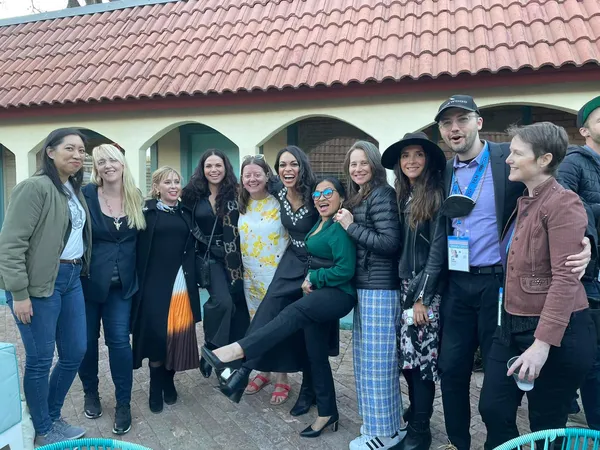 |
| The Split At The Root team all together at SXSW Photo: Split At The Root |
Despite the controversy around many policies introduced under Donald Trump’s regime, the one probably responsible for the most international outrage was the zero tolerance policy on immigration. It was this which led to families being detained in atrocious conditions at the border and, still more notoriously, children being taken from their parents and put up for adoption elsewhere. The stories of what happened to some of those children are horrific, but there are also stories with more positive endings. Some children were reunited with their parents and were able to start new lives. Documentary Split At The Root explains how.
Joining me to discuss the film following its screening at SXSW were producer Maria Grasso and Julie Collazo, one of the founders of Immigrant Families Together, an organisation dedicated to reuniting and supporting those who have faced separation as a result of the policy. Maria kicked off our conversation by explaining how the film took shape for her.
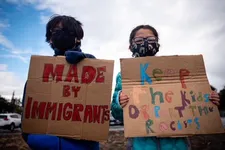 |
| Protestors against the zero tolerance policy Photo: Brooke Anderson |
“When the news coverage alerted us to zero tolerance policy and the family separation, it really was rattling a lot of Americans, and that had been going on for about a year before we got involved,” she says. “I run Marti Noxon’s company. I don't know if you know Marti's work, but she's created such series as Sharp Objects, Dietland, UnREAL, Girlfriends’ Guide To Divorce – and, you know, typically, we're looking for narrative series. But we've always been interested in the documentary space, and separately from work, Marti was fundraising to help families who were separated under the zero tolerance policy, and she was alerted to an organisation called Immigrant Families Together that had been together for about a year.
“Somebody connected Marti to Julie and they had a really meaningful phone conversation, and of course Marti wanted to donate, but she said to Julie, ‘What else could I do?’ and Julie said ‘Tell our story.’ So Marti immediately called me and said, ‘I think I have our documentary.’ And I was all in. We had worked previously with a director named Linda Goldstein Knowlton, who really has the right spirit as a human being and the type of sensitivity that a director would need going into this type of situation. We immediately called Linda and she was in, and within the first couple of weeks of that conversation between Julie and Marti, Linda was there with her very small crew meeting Julie, Rosy and Megan for the first time.”
Julie explains how her organisation developed.
“I'm a former social worker. My husband Francisco, who is the co founder, is a refugee from Cuba who arrived in the United States in the Mariel Boatlift in 1980. He also has a background in social service work, specifically working in prisons, preparing men who are re-entering society after long prison sentences – people, specifically, who have acute or chronic mental health issues. Together, we have three children. So there was a lot about the zero tolerance policy that felt especially personal for us. I think it would have horrified us under any circumstances, but the fact that we possess that background, both personal and professional, really compelled us to think every single day as we were watching these horror stories unfold at the border, about how we could use our skills and our background to actually be helpful, as opposed to just being angry on Facebook all day long.
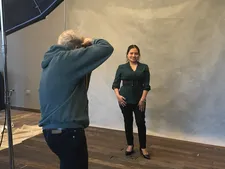 |
| Gaining a voice Photo: Split At The Root |
“We certainly were not intending to start an organisation. We were looking to join some kind of existing effort. But then I heard an attorney here in New York, on the radio, talking about his client Yeni Gonzales Garcia, who is a mom from Guatemala who was separated from her three children at the border – they were sent to New York and put in a foster care facility while she remained in detention in Arizona. And the attorney said something that, for me, was really the lightbulb moment. He said, ‘She doesn't have to be separated from her children, she can be reunited with them,’ because unlike so many other parents and guardians who were affected by zero tolerance, she actually knew where her children were. And so he said, ‘All she needs is to be able to pay her bond and to get from Arizona to New York.’ And for me, that was the moment. I didn't know how much the bond was but I really felt that among our friends who were outraged about zero tolerance, that we could raise the money to get her out and figure out a way to get her across the United States.
“What I did not expect was that there would be so much motivation on the part of so many other people that I didn't know that by the next morning, we would have exceeded what ultimately was posted in her bond, which was $7,500. We would continue raising enough money to get many other mothers out. And that was largely thanks to Yeni, not just because of the donations that we had received, that were started by her story, but also because she came out of detention with a mental list of other women with whom she had been detained. And those women were moms who had also been separated and had been offered bonds. And so we were using her list and initially working with her attorney to begin focusing on for other women, and it just never stopped.”
So how did the two of them work out how they were going to take the story forwards, and which aspects of the story would be covered in the film?
“Well, we knew we had a really interesting opportunity as a result of the relationships that Julie and the core IFT volunteers had established with the immigrant families that they were bonding out and reuniting, and remaining in their lives throughout this process of not only the hearing, which would determine if asylum was granted or not, but just to really help their families thrive in a situation that is often untenable,” says Maria. “So it was really obvious for us early on, when we started to get to know them, that our focus in this story was going to be giving Yeni and Rosy a platform to tell their own story, in their own words. Since the film covers about two and a half years, we were really able to go beyond the crisis at the border, and them being identified only with that crisis, and really see what it's like to come to America during this time and establish roots with your family.”
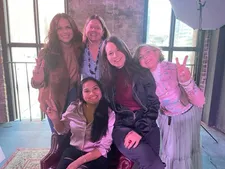 |
| Women making a difference Photo: Split At The Root |
“After I left the field of social work, I became a writer and a journalist,” says Julie. “I had a lot of contacts in media and of course, media in the US and everywhere abroad was interested in this story, and so marshalled up a lot of my media contacts to cover the story, and their colleagues did as well. And so there was a lot of footage generated, even from the very beginning with Yeni. And even before we actually got her out, when our core team was assembling and giving up our time, in my apartment, back in June of 2018, we had someone who happened to be filming the whole thing. So there was a lot of archival footage and Linda draws from that. It represents those early days of IFC and of getting stories out before Linda and her film crew came onto the scene.”
Maria acknowledges this. “It was essential that we came on a year into IFT being formed, Yeni and Rosy being reunited with their families, and we were able to cover that not only in their testimonials and their interviews, but we could back it up with footage. It really makes the piece, in my opinion – the film feel very cohesive from the origin story to where we are now.”
In terms of origin stories, we don’t see much in the media about what prompts migrants in the Americas to leave their home countries, but this film tries to rectify that, as Julie explains.
“It's really a complex set of factors,” says Julie. “I think the stories of both Yeni and Rosy, while they're different, they're quite representative of the number of people who flee from their countries, and their stories. Certainly in Rosy’s case, there was the actual threat of violence and actual violence that had been carried out. Her husband was murdered about 13 years ago. Subsequently, someone attempted to murder her, and her oldest child witnessed that. She was a business owner so she began to be extorted by local gangs and cartels. And when she refused, and was unable to continue paying the extortionary fee, they said, ‘Well, you can give us your oldest son if you don't want to pay the money.’ That was really the prompt for her to flee from Guatemala.
“Yeni’s story is slightly different, in that she did not experience physical violence directly but the threat of violence made her want to protect her children and flee for a place that she felt would be safer. But certainly gang and cartel violence are often prompts and those are valid means for seeking asylum under US law. But there are a whole host of other reasons. Actual persecution based on sexual orientation, lack of jobs, climate change cause factors as well. So there's a number of variables and certainly they're the same ones that are generating the migrant crises that are affecting Europe as well.”
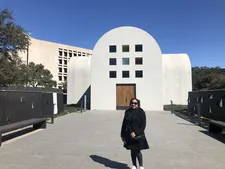 |
| Finding a place Photo: Split At The Root |
In addition to this, the film looks at what happens to immigrant families after they are reunited, and at the trauma and the damage done by experiences of being in detention. Was that an area which the documentary team felt had not been addressed enough?
“From an organisational perspective, I think so,” she says. “Maria can certainly speak more to it in film but I think in media of all sorts, that longer tail story of what happens to someone after that acute moment of trauma that prompts them to flee, that greets them at the US border and sort of follows them throughout their asylum seeking experience before the immigration court. Meanwhile, they're still working on building a life.
“When we were together at SXSW this week, one of the things that Rosy said to interviewers that I think is so powerful was ‘You often ask me about my past, but you're not asking what's happening in my present and my future. And that's what I'm really interested in, right? I'm really interested in where it is that I'm going, and how I'm getting there.’ And so I think that it's so vital, in our work as an organisation, to really capacitate families, to support them in their goals and their dreams for the longer term. And I think in media representation, it is vital, because so often, we're just seeing the story of the crisis as its unfolding, and then it kind of evaporates and nobody really knows what's happening, and then they move on to the next crisis, because we never have a lack of them.”
“I agree 100%,” says Maria. “And the other thing that was essential for us was, it's really clear that people are making the choice to flee their country for the safety of their children, and for the opportunity for them to grow up in an environment where they truly have a future. And so also, especially with Rosy's boys, we were able to spend time with them and capture them in both interviews and vérité. We also have a little with Yeni’s family, and Yeni at the end speaks so heartful, about asking her children to forgive her, you know, because she didn't anticipate that the journey would be as dramatic and they would undergo the experience to the extent that they did. But we wanted to really capture, again, the fullness of the story, and that involves the children and the family.”
She’s feeling very positive about their time at SXSW.
“I thought it was an amazing experience. And even the lead up, you know, we've been having a lot of sessions with various reporters to finally have the film reviewed and seen by audiences, to be able to talk about it. Because this isn't a film where the conversation is about the making of the film, it's a conversation about content that is still incredibly relevant. So right now the conversations about receiving distribution will start to happen. So I feel like I'm still buzzing.”
“I agree,” says Julie, and laughs. “I may be on my third cup of coffee, though, so that could be contributing. But I think it was really thrilling for all of us who worked on the film to see Rosy at SXSW and to have daily informal debrief with her about what the experience is like for her. And one of the things that she shared with us is that she felt that this week was really an opportunity for her to confront a lot of fears.
“She says there are a lot of narratives that are imposed on Central Americans in particular, but asylum seekers generally, kind of saying ‘This is your place. This is where you belong and stay quiet. You don't have a voice. You don't deserve to share your stories.’ And she says that this week was really an invitation for her to contest those fears and start pushing back against them and saying ‘No, I do belong here. My story is valid and it is valuable. And it can be for the mirror to hold up for other people to see themselves in my voice and to inspire them to share their own stories, if and when they feel comfortable doing that.’ And I think that we can all agree Rosy was an incredible composed, meaningful, impactful speaker on the panels that we did. So for her to really be getting that from the experience of having been at SXSW was gratifying for all of us.”
























